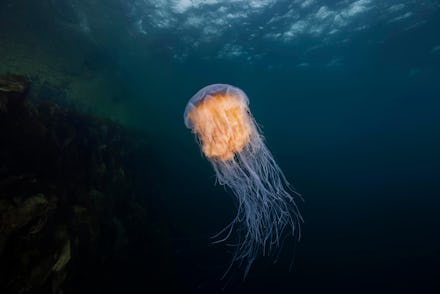You might eat jellyfish and get food through microchips in the future, says a wild new report

What will the future taste like? Pretty different, according to a new report on the future of food. As grocery shopping becomes more of an online activity than a physical stroll through a store, and climate change threatens to all but deplete our food system as we know it, it seems like what we eat — and how we eat — might change drastically before long.
The report was compiled by Sainsbury's, the second largest supermarket chain in the U.K. and the first British supermarket to introduce specialty cheeses like Gorgonzola and Camembert in 1880 (not to mention the first to introduce avocado in 1962). The company used its 150-year history to predict human food habits in 2025, 2050, and 2169, aka 150 years from now, and while the results may be geared towards British people, they could be right for just about everyone. Here are the biggest takeaways:
Everyone will eat their veggies
According to the report, the near future, at least, will be all about plant-based foods. By 2025, a quarter of British people might be vegetarian (only one in eight are now), with almost half identifying as flexitarians (up from today's one in five). This prediction is based on a steady 24% increase in customers searching for vegan products online, as well as a 65% increase in sales of plant-based products year-over-year.
Jellyfish will be all the rage
By 2050, lesser-eaten seafood species such as porgy/bream, dogfish, lionfish, barramundi, and jellyfish may replace common seafood species like salmon and tuna. This makes sense, as jellyfish blooms have become more pervasive in recent years due to increased ocean temperatures and a lower ratio of predators thanks to overfishing.
Don't be grossed out by the thought of spineless sea creatures for dinner. Jellyfish are actually not such a bad option, as they're low in calories and fat; high in protein, collagen and nutrients; and a malleable ingredient able to be enjoyed in hot or cold dishes. Besides, they're already consumed in several countries across the globe, with marinated jellyfish salad common (and typically expensive) in China, for instance. Plus, the dish can pair nicely with other oceanic greens, like seaweed and algae, that have already surged in popularity, and are expected to moreso, according to the report.
You might grow your own meat
The concept of animal-free meat might sound odd, but it's predicted to peak by 2050. The report notes that due to new innovations, branding, and marketing in cultured meat, the coming years might see "a radical shift from perceiving meat as innate to animals to perceiving cultured meat as a healthy and efficient protein tissue that is lab-grown, much in the same way we brew beer."
Already, biologists have developed methods for manipulating animal cells and proteins into edible (and tasty) meat, so don't be surprised if you one day find yourself culturing meat at home like it's a cute succulent instead of heading to the butcher.
We'll all be microchipped
While the near-future predictions discussed above might feel mostly understandable based on the way many of us are eating today, things could get really bonkers by 2169. At that time, the report predicts, descendants of today's population will be implanted with personal microchips to monitor their health and nutrient levels. When a person needs a specific nutrient or food, it could be seeped into their body from said microchip (or be rapidly delivered by drone, which is only slightly less creepy).
And no, this isn't some wild sci-fi plot. Thousands of people in Sweden already have microchips implanted in their skin to make daily life more efficient, allowing them access to their home or gym or even public transit with the swipe of their own body. The U.S. Military has also been working on a transdermal nutrient patch for the greater part of this millennium, which will infuse necessary nutrients directly into the wearers' skin.
If, as the report suggests, the world is forced to finally deal with irreparable climate damage and zero-waste laws are put in place around 2169 (or, hey, we're relegated to living on Mars where eating as we know may be impossible thanks to lack of breathable air, gravity, extreme temperature, etc), this kind of technology might really come in handy. Regardless of where we end up, though, the report's message is clear: if we don't act soon to halt climate change and reduce humankind's toll on the environment, life as we know it will change drastically. Jellyfish meals included.